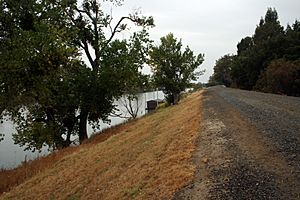Levee facts for kids

A levee (pronounced LEV-ee) is like a raised wall or bank, often made of earth. It runs along the side of a river or a coastline. Its main job is to protect the land and people from floods. When a river gets too full, a levee stops the water from spreading out.
People also call levees by other names, like dike (especially in Europe), floodbank, or stopbank. The word "levee" comes from the French word lever, which means "to raise." The word "dike" comes from the Dutch word dijk.
Contents
What is a Levee?
A levee is a long, raised structure. It is usually built from soil, sand, or clay. Levees are often built to follow the path of a river. They act as a barrier to keep water in its channel. This helps prevent floods during heavy rains or melting snow.
Types of Levees
There are two main types of levees:
- River levees: These are built along rivers to protect nearby towns and farms from river floods.
- Sea levees: Also called dikes, these are built along coastlines. They protect land from high tides and storm surges from the ocean.
History of Levees
People have been building levees for thousands of years. They learned early on how important it was to control water.
Ancient Levees
The first known levees were built in ancient Mesopotamia. This was about 5,000 years ago. These early levees were simple earth walls. They protected communities from floods caused by melting snow and heavy rains.
Around 3,000 years ago, people in ancient Egypt also used levees. They were part of clever irrigation systems. These systems helped farmers bring water to their crops from the Nile River.
Modern Levees
The idea of sea dikes became very important in Holland. In the year 1277, the Dutch started building advanced sea dikes. These structures helped them reclaim land from the sea. They also protected their low-lying country from ocean floods.
The term "levee" became common in English around 1672. This was in New Orleans, a city in the United States built near the Mississippi River.
Images for kids
See also
 In Spanish: Dique para niños
In Spanish: Dique para niños
 | Laphonza Butler |
 | Daisy Bates |
 | Elizabeth Piper Ensley |




